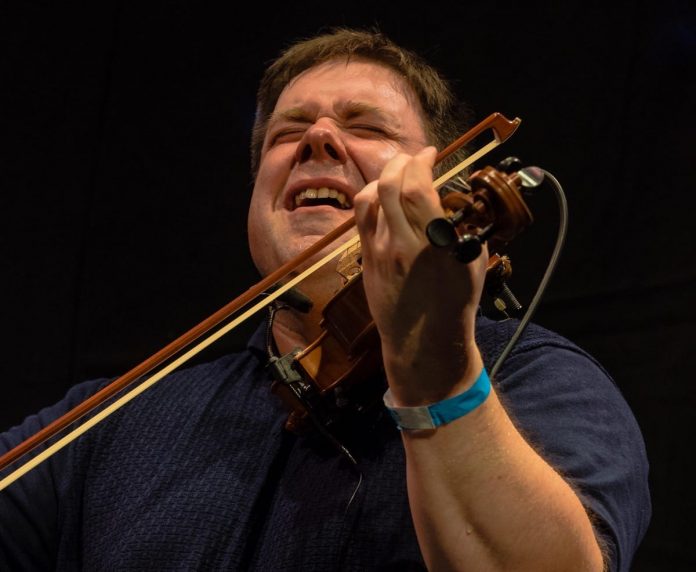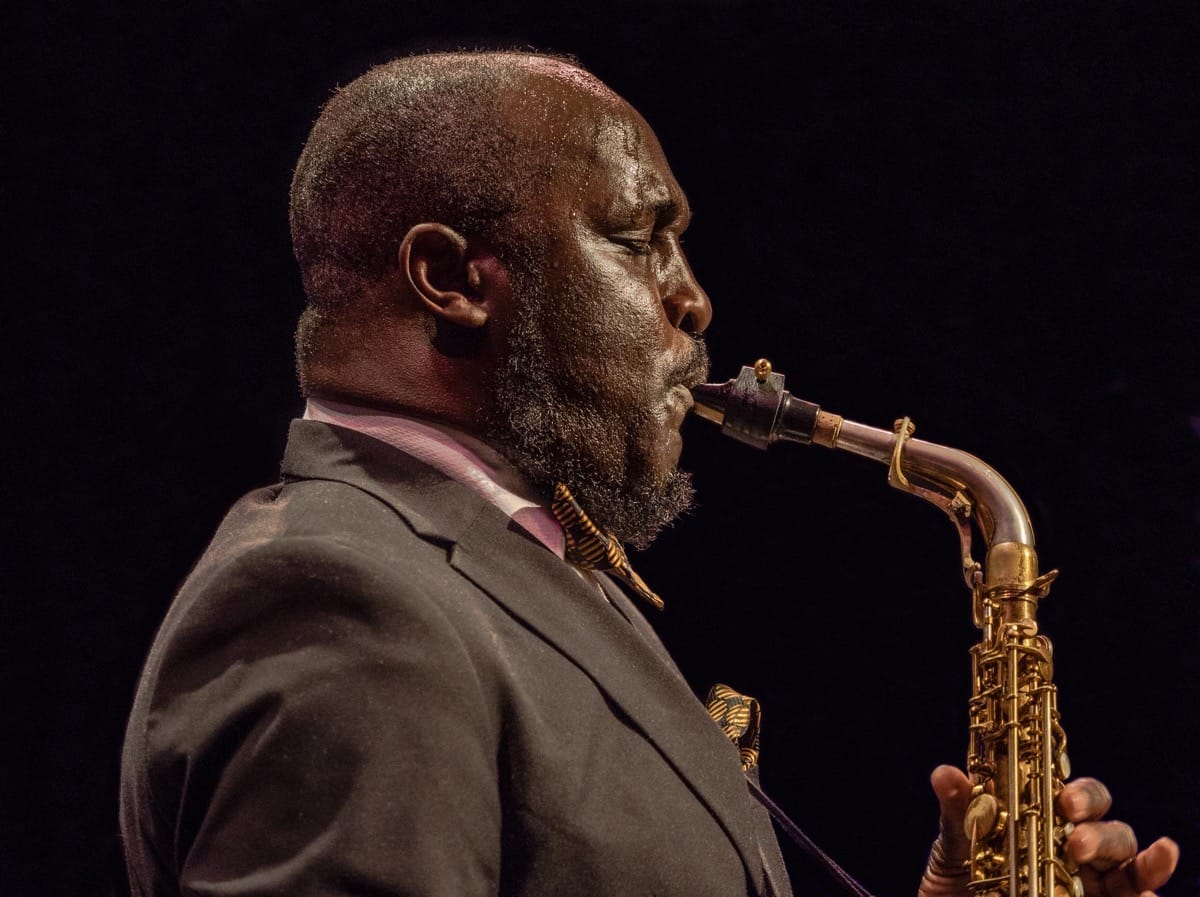
The 18th Scarborough Jazz Festival took place on a warm and sunny weekend from 24 to 26 September. It was great to be back and a real pleasure to witness one of the strongest lineups to date at this superb coastal venue.
Friday began at lunchtime with Rafe’s Dilemma – introduced by vocalist Nel Begley as an electronic jazz and spoken word band. With a performance inspired by plays and novels and reminiscent of sketches from avant-garde theatre at times, this band is refreshingly different. Begley displayed a marvellously versatile voice and a commanding stage presence. Jamil Sheriff was highly inventive on keys and Katie Patterson was dynamism itself on drums. She also supplied backing vocals. Full marks to Pete Gavin who stepped in on bass – you’d never have guessed this was a last-minute change as his delivery was so seamless.
The Dave O’Higgins & Rob Luft Quartet followed, with their take on Monk and Coltrane. Ross Stanley was at the Hammond organ and Rod Youngs on drums. This was the band’s first outing after 18 months. They opened with ’Round Midnight and the set included Straight Street, Naima (after Coltrane’s first wife), Four In One (based on Five Foot Two, Eyes Of Blue), and a mash-up of Giant Steps and The Night Has A Thousand Eyes with added harmonies devised by saxophonist O’Higgins and guitar wizardry from Luft. Minor Mishap followed and to close, it was Epistrophy with the wonderfully expressive Youngs dazzling on drums.
Two more guitar wizards came on next in the form of Pete Oxley and Nicolas Meier. This was a master class in guitar playing. Several of the nine instruments used in the performance were fretless and they all sounded different. All their numbers were originals with Meier’s Princes Islands and Oxley’s Piece For Peace from the duo’s Colours Of Time album being especially enchanting.
The impressively cohesive Swiss trio, Vein – brothers Michael and Florian Arbenz on piano and drums respectively and distinguished bassist Thomas Lahns – took Friday’s early evening spot with Stan Sulzmann guesting on tenor sax. He’d last played with the trio in 2018. Michael Arbenz’s arrangement of Ravel’s Mouvement De Menuet and Sulzmann’s Chu Chu named after Colombian bassist Chucho Merchán were particularly well received.
Another exceptionally fine trio followed with Julian Joseph on piano and the stellar rhythm section of Mark Hodgson on bass and Mark Mondesir on drums. Joseph of course is well known to many at Scarborough as Radio 3’s presenter of Jazz Lineup and J To Z but this was the first time he’d performed in his role as pianist here. Much of Joseph’s engaging repertoire comprised musical portraits of people important in his life such as the composition for his mother who died in 2011, one for a friend killed in a gun crime and one concerning a reverend who’d helped him with accommodation when he was a music student in Boston. With something of a change from this biographical content he concluded the set with a lovely arrangement of Ellington’s Do Nothing Till You Hear From Me with profound bass from Hodgson and ultra smooth brushwork from Mondesir.
Friday night ended with pianist and arranger Hans Koller and his 13-piece Bird Migration Big Band celebrating the centenary of Charlie Parker. The concert afforded some splendid improvisational soloing from band members: of particular note were those from Byron Wallen on trumpet and Malcolm Earle-Smith on trombone in Billie’s Bounce and Zhenya Strigalev’s gripping solo on alto sax in Milestones.
Saturday began with gypsy swing band Djanco featuring Andy Aitcheson on violin with siblings Thom Whitworth on lead guitar (sometimes mini trumpet), Rich Whitworth on bass and Robert Caswell-Jones on rhythm guitar. Their act proved to be one of the highlights of the festival. Alongside expert musicianship and instrumental dexterity, Thom Whitworth and Aitcheson managed to pull off a hilarious double act of one-upmanship involving the violinist leaning persistently into Whitworth’s personal space feigning to challenge the guitarist’s musical prowess. The latter would recoil and then respond by bettering his performance even further. The duel lasted through the whole performance. Whitworth’s irrepressible humour and wonderfully faux expressions of shock and determination upon each confrontation make me laugh even now. Undeterred by the shenanigans in their midst, his brother on bass and Caswell-Jones on rhythm managed admirably to maintain the straight-man act. The repertoire included Django’s Tiger, Swing 48, Swing For Ninine, Minor Swing and Lulu Swing. Uniquely for a gypsy-swing outfit the band closed their act with a vocal four-part harmony of I Can’t Give You Anything But Love. Entirely unexpected! If you get the chance, go and see this band – they’ll cheer you up no end.
Karen Sharp’s Quartet followed with another formidable rhythm section to grace the stage this weekend – bassist Dave Green and Steve Brown on drums. Nikki Iles was on piano and Sharp on tenor and baritone. Iles experienced issues with an uneven sound balance at the start but these were eventually sorted out. The session included Bill Evans’ Interplay and Harry Warren’s Summer Night, Monk’s Pannonica, Clare Fischer’s Pensativa, Berlin’s How Deep Is The Ocean, John Scofield’s Not You Again and Bobby Wellins’ tribute to Clifford Brown, See You CB. This flawlessly executed set closed with a contemplative rendition of Denny Zeitlin’s ballad, Quiet Now.
Nikki Iles returned to the stage later in the evening with her 18-piece Jazz Orchestra and its cast of top-notch British jazz musicians.The repertoire for the set was mostly written by Iles. It included Wild Oak in tribute to Geri Allen and Red Ellen in memory of socialist MP Ellen Wilkinson, the latter piece having riveting solos from Mike Walker on guitar and Nick Smart on trumpet. Big Sky was inspired by the flat landscape of Ely, Iles’s birthplace and had splendid trombone soloing from Gordon Campbell. The Caged Bird was composed after Iles had been cooped up during the lockdown. It featured stirring solos from Karen Sharp and Andy Panayi on alto. From his vantage position at front centre Panayi also helped conduct some of the concert’s passages while Iles was at piano left. Vince Mendoza’s Hero With A Thousand Faces featured excellent solos from Julian Siegel and Walker (again). A dramatic piece, High Lands, about novelist Mary Webb’s life in Shropshire, was arranged by Stan Sulzmann. Most of the orchestra members delivered solos during the concert but are too numerous to cite individually in this write up. After the closing number, Steely Dan’s Do It Again, the orchestra received a well earned ovation from the Grand Hall’s audience.
Zoe Gilby delivered a selection of songs from her 2020 album Aurora, in which she added words to tunes by trumpeter Tom Harrell. Harrell had approved of her lyrical interpretations but for copyright reasons the songs were retitled. Her quintet comprised Noel Dennis on trumpet and flugel, Mark Williams on guitar, bassist Ken Marley (who’d stepped in at short notice in place of Andy Champion) and Richard Brown on drums. Gilby is skilful at writing creative lyrics but she inserted some scatting into the menu this evening. I think more of her poetic lines might have been better. One of the numbers, The Midnight Bell, was inspired by Patrick Hamilton’s eponymous novel and her expressive delivery of this and Dennis’s superb muted accompaniment went down a treat with the audience.
Saturday night finished late with Jean Toussaint’s Allstar 6tet assembled to mark Art Blakey’s centenary. Toussaint was one of Art Blakey’s Jazz Messengers in the mid-80s. With Toussaint on sax, Byron Wallen on trumpet, Dennis Rollins on trombone, Andrew McCormack on piano, Orlando le Fleming on bass and Ben Brown on drums this promised to be a cracker. Not every number played related directly to Blakey; for instance, Kenny Dorham’s Windmill had Philly Joe Jones on drums when recorded in 1961 though Dorham had been a Messenger in the 50s. But no reason to quibble, this hard-swinging set was delivered with passion and was well received by an appreciative audience.
Sunday was seen in by the Fergus McCreadie Trio. McCreadie was named best instrumentalist in the Scottish Jazz Awards just before the pandemic began. With David Bowden on bass and Stephen Henderson on drums the trio launched into their first number with no announcement – and they kept at it for half an hour. This was dramatic stuff with a series of escalating piano climaxes accompanied by pulsating drums. After each climax the tempo slowed with a return to soft brush work and bass soloing taking over the melody. This rise and fall pattern permeated the performance and indeed the succeeding numbers. Hints of a recurring Scottish folk song theme seemed to be at the heart of everything throughout the set. At the close, parts of the impressed audience stood and cheered.
Tony Kofi brought to Scarborough yet another mighty bass and drums pairing – Andrew Cleyndert and Alfonso Vitali. Andy Davies was on trumpet, Alex Webb on piano and Kofi on saxes. The performance was entitled “A Portrait Of Cannonball”. This foot-tapping, hard-bopping set began with The Chant by Victor Feldman. That was followed by Nat Adderley’s Teaneck and then Bohemia After Dark from Kenny Clarke’s 1955 album, which featured the earliest Adderley recordings. In a brief interlude, Alex Webb provided one of his signature narratives, this time about the background to that record and Adderley’s early experience. Operation Breadbasket, a Kofi composition, was followed by Sack O’ Woe with smashing soloing from Kofi, great walking bass and a commanding bass solo from Cleyndert. I hadn’t come across Davies before but he was the bees knees on trumpet and his interplay with Kofi was spot on. Next, a superlative rendition of Stars Fell On Alabama had Kofi with just bass and drums and was followed by Things Are Getting Better from Adderley’s 1959 album. The Chicken was introduced by Kofi as a tribute to its composer, Pee Wee Ellis. He announced that Ellis had sadly died last week and had been a mentor to him. The band finished with Another Kind Of Soul from Kofi’s current album which pays homage to Cannonball Adderley.
With David Newton’s fine accompaniment on piano, John Pearce (pictured at the top by Brian Payne) stunned the audience with what was probably the most virtuosic violin performance many of us had seen. It was something akin to one of those YouTube clips where an unlikely figure ambles into, say, Euston Station and sees an old piano. He sits down and suddenly plays like Chopin bringing tears to the eyes of mesmerised commuters. This was astonishing stuff. For much of the session Pearce stood facing Newton and the Bösendorfer grand, totally immersed in the music. He said little and just let his violin sing. He began with Jerome Kern’s The Song Is You, which was followed by Bruno Mantino’s Estate, Bernie’s Tune, So Dance The Samba and The Coffee Song. When Pearce played Moonlight In Vermont it was so emotional you could hear a pin drop. Even David Newton looked moved by the intensity emanating from the violinist. This was a truly remarkable performance. The ovation was deafening.
I’m afraid I had to miss Sunday’s final performance – Alan Barnes Octet – in order to catch the last shuttle bus to the cliff top. There’d been no lift operating over the weekend owing to renovations to the cliffside gardens but it will be back next year – as I certainly will. This year’s festival was one of the best I’d been to at Scarborough.
















